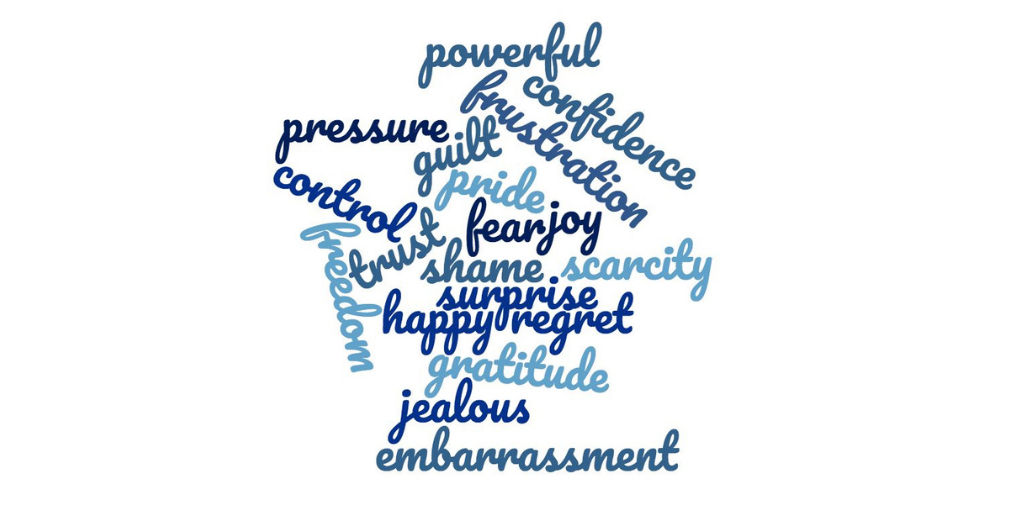Recently, I was interviewed by Michelle Fox of CNBC for a piece that ran on their blog – “Two thirds of investors regret emotional, impulsive investing decisions. Here’s how to not be one of them.” (It went live two weeks ago; you can read it here.)
After 30+ years in the financial services industry and working with people across the income and wealth spectrums, I’ve seen a lot (believe me!). I have the privilege of sitting alongside folks as they work to manage the different ways in which their emotions influence their behavior, choices, and results.
Hence, I have a front row seat to what happens when some people embrace their emotions.
Likewise, I see what happens when some people would prefer to detach their emotions from their financial decisions and actions.
This matches with the focus of Michelle’s piece.
It’s almost as if the less emotional you are, the more heroic you are. It’s as if being non-emotional is somehow a badge of honor.
But as I mentioned during my conversation with Michelle, we’re humans; thus, we are emotional beings. That means it is futile to try and not be emotional – especially when it comes to money.
I truly believe this.
And perhaps you gleaned this from what I wrote last week when we talked about power: I think one of the best ways to harness your financial power is to acknowledge your feelings, and use that insight to help you take informed action.
In my opinion (and from my observation), it’s much better than denying or suppressing your emotions. Because this is not effective when it comes to any area of your life – but especially in the realm of money.
Why Emotions Matter
Since you deal with money and emotions all the time, today I thought I’d use this space to make a case for embracing your emotions. Especially if you’re not yet fully on the money/emotions bandwagon:
There’s a spectrum
I believe part of the issue when it comes to emotions and money is the tendency to label some emotions as “good” and others as “bad.” Those labels end up putting a value judgment on how you’re feeling. And that “value” may be misplaced.
That’s why I prefer to think of emotions as existing within a spectrum.
This way, you avoid the trap of labeling fear as a “bad” emotion. When it may actually save you from making a costly mistake. Similarly, you’ll avoid the trap of labeling confidence as a “good” emotion. When it may be the reason you don’t ask the right questions – which could also result in a costly mistake.
Which risk?
Most often, people focus on one type of risk – the one that poses the greatest threat of potentially losing something. What frequently gets overlooked, though, is opportunity cost – which is another type of risk. When you acknowledge your emotions, they can help you determine which risk you are prioritizing.
Do you seek help?
Your emotions can play a significant role in whether or not you raise your hand and ask for help. However, from what I’ve observed, people know when they need help. They just get stuck asking for it because of why they need it. (They lean too much into feeling embarrassed or ashamed.)
Nothing is static
There are a variety of factors that influence your emotions (and dare I say your emotional baggage):
- Your upbringing (family and cultural influences)
- Your community (friends, peers, and colleagues)
- Your own experiences (including what you’d claim are wins and lessons)
- Messaging from the financial services industry and the media
Your relationships with each of these factors isn’t static. Neither are your emotions associated with these factors, particularly when they overlap with some aspect of your money.
Dispelling a few myths
It’s a myth to believe rich and wealthy people are precluded from financial challenges, questions, and frustrations. They simply have more resources at their disposal to handle them.
Similarly, just because someone isn’t rich or wealthy doesn’t mean they don’t handle their money well.
It’s also a myth to believe that investing time, energy, and resources to better understand your relationship with money – and what you want it to do for you – is just for when you feel strapped. (Can you imagine a professional athlete only working with a coach when they were in a slump?)
Back to the beginning…
Emotions matter.
They matter because they have an impact on your stress level, mental health, and potentially on the health of some of your key relationships. This is one truth.
It’s also true that you need to feel emotionally safe in order to take whatever may be your next steps – however small or large those steps may be.
Being emotional is natural, so it is futile and unnatural to try and not be emotional.
But being impulsive…now that is entirely a choice.
Thanks to 30+ years (and counting) in the financial services industry, I know the distinction between being emotional and being impulsive is yet another truth worth highlighting!





